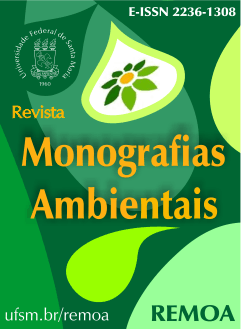Family farming in the scenario of production of energy forests
DOI:
https://doi.org/10.5902/2236130814716Keywords:
Family Farming, Firewood Market, ProfitabilityAbstract
The aim of this study is to analyze the production of energetic forests of eucalyptus as an alternative economic in family farming region of Espumoso – RS, using resources from Harvest Plan 2012/2013. The methodology used for market research, survey implementation and maintenance cost and price was the application of open questions via phone, email and on-site for professionals, institutions and companies in the forest sector in the region. For the analysis of the economic viability of the energy market in the region has created a scenario of 1 hectare to produce wood for energy cut at 5 years of age, sale of forest standing, price and average increase of respectively R$ 50.00m³ and 250m³/ ha/year. The average costs of deployment and maintenance are R$ 2,905.50 and economic evaluation of the scenario was calculated using the NPV, IRR and B/C. The scenario was considered viable, with positive NPV, IRR greater than the minimum rate of attractiveness and B/C greater than 1. With this study we can conclude that investment in deployment of eucalyptus plantations in the region of Espumoso is a great option to increase the financial return provided by rural activity.
Downloads
References
AFONSO JÚNIOR, P.C.; OLIVEIRA FILHO, D. Estudo da viabilidade econômica de produção de lenha de eucalipto (Eucalyptus sp.) em área de lavoura para secagem de produtos agrícolas. In: Eng. Agríc., Jaboticabal, v.26, n.1, p.28-35, jan./abr. 2006.
COTRIEL, 2011. Cooperativa Tritícola de Espumoso Ltda. Espumoso, RS. EMBRAPA – Empresa Brasileira de Pesquisa Agropecuária. Disponível em: http://www.embrapa.br/imprensa/artigos/2002/artigo.2004-12-07.2590963189/. Acesso: 01/11/2012
IBGE. Instituto Brasileiro de Geografia e Estatística. Censo Agropecuário 2011.
IBGE. Instituto Brasileiro de Geografia e Estatística. Produção da Extração Vegetal e da Silvicultura. 2010.
RODIGHERI, H. R. Rentabilidade econômica comparativa entre plantios florestais e sistemas agroflorestais com erva-mate, eucalipto e pinus e as culturas do feijão, milho, soja e trigo. Colombo:EMBRAPA-CNPF, 1997. 36p. (Circular técnica, n.26).
Downloads
Published
How to Cite
Issue
Section
License
Ethical guidelines for journal publication
The REMOA is committed to ensuring ethics in publication and quality of articles.
Conformance to standards of ethical behavior is therefore expected of all parties involved: Authors, Editors, Reviewers, and the Publisher.
In particular,
Authors: Authors should present an objective discussion of the significance of research work as well as sufficient detail and references to permit others to replicate the experiments. Fraudulent or knowingly inaccurate statements constitute unethical behavior and are unacceptable. Review articles should also be objective, comprehensive, and accurate accounts of the state of the art. The authors should ensure that their work is entirely original works, and if the work and/or words of others have been used, this has been appropriately acknowledged. Plagiarism in all its forms constitutes unethical publishing behavior and is unacceptable. Submitting the same manuscript to more than one journal concurrently constitutes unethical publishing behavior and is unacceptable. Authors should not submit articles describing essentially the same research to more than one journal. The corresponding author should ensure that there is a full consensus of all co-authors in approving the final version of the paper and its submission for publication.
Editors: Editors should evaluate manuscripts exclusively on the basis of their academic merit. An editor must not use unpublished information in the editor's own research without the express written consent of the author. Editors should take reasonable responsive measures when ethical complaints have been presented concerning a submitted manuscript or published paper.
Reviewers: Any manuscripts received for review must be treated as confidential documents. Privileged information or ideas obtained through peer review must be kept confidential and not used for personal advantage. Reviews should be conducted objectively, and observations should be formulated clearly with supporting arguments, so that authors can use them for improving the paper. Any selected referee who feels unqualified to review the research reported in a manuscript or knows that its prompt review will be impossible should notify the editor and excuse himself from the review process. Reviewers should not consider manuscripts in which they have conflicts of interest resulting from competitive, collaborative, or other relationships or connections with any of the authors, companies, or institutions connected to the papers.






